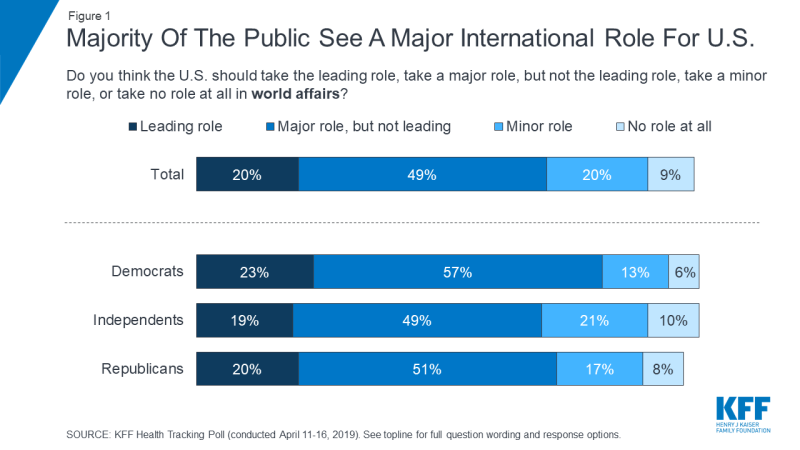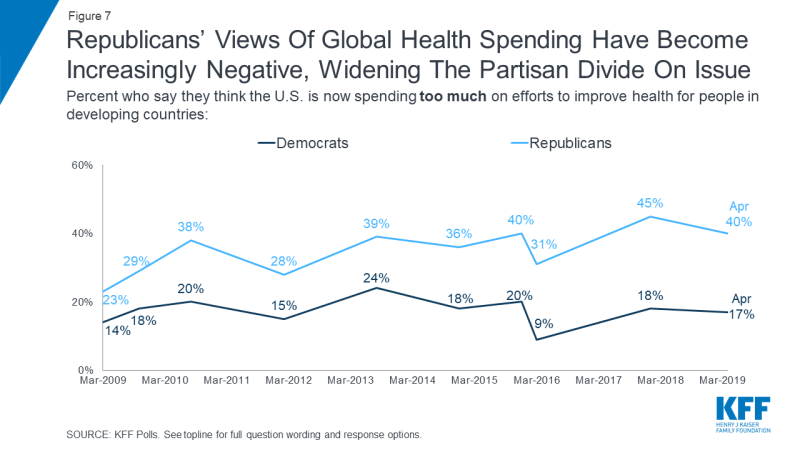Where Does Public Opinion Stand on the U.S. Role in Global Health?
The Kaiser Family Foundation (KFF) has been tracking public opinion on the U.S. role in global health for the last decade. Now, more than two years into President Trump’s administration, the April 2019 KFF Health Tracking Poll examines whether this period, which has been marked by a changing U.S. stance toward international affairs, has shifted the public’s attitudes on these key issues. Has, for example, the administration’s promotion of an “America first” approach, which has included proposed cuts to U.S. global health programs, affected the public’s support for U.S. engagement to improve the health of those in low and middle income countries? Here we provide an overview of our latest findings, and also look at whether there have been any changes over time.
Americans’ Views on the U.S. Role in World Affairs and Global Health
Consistent with previous KFF polling our latest poll finds broad support (68 percent) for the U.S. playing at least a major role in world affairs (Figure 1), and six in ten (58 percent) believing the U.S. should play a “leading role” or “major role” in improving health for people in developing countries (Figure 2). In the latter case, larger shares of Democrats (70 percent) say they want the U.S. to take at least a major role compared to Republicans (37 percent) or independents (55 percent).
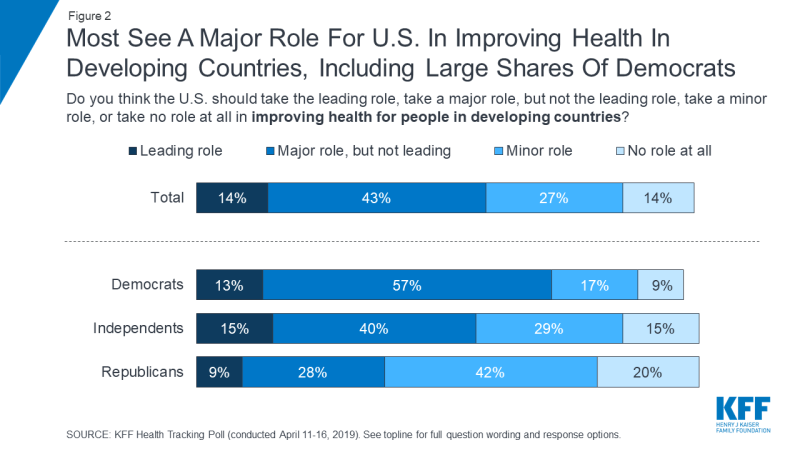
Figure 2: Most See A Major Role For U.S. In Improving Health In Developing Countries, Including Large Shares Of Democrats
About half of the public (49 percent) think the U.S. is spending “too much” on foreign aid, similar to previous KFF poll findings (we have also found that the public greatly overestimates what is spent on foreign aid. See: https://www.kff.org/global-health-policy/poll-finding/americans-views-on-the-u-s-role-in-global-health/). However, when asked about U.S. spending specifically on efforts to improve health in developing countries, a much smaller proportion (29 percent) say the U.S. is spending “too much,” with a majority saying U.S. spending is “about the right amount” (31 percent) or “too little” (29 percent) (Figure 3).
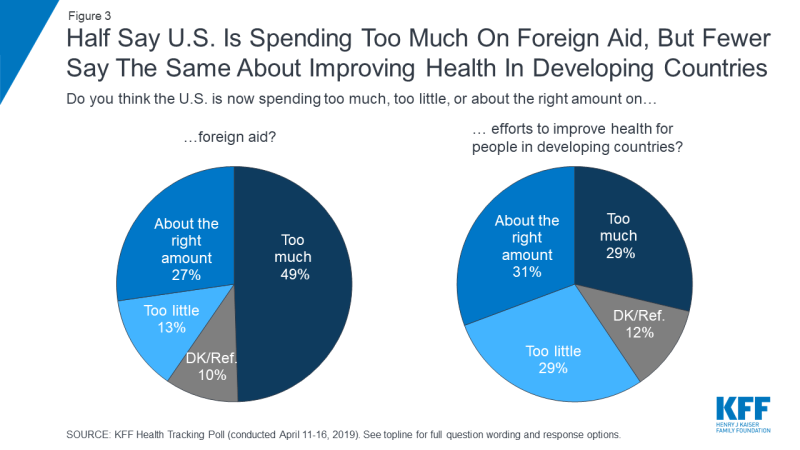
Figure 3: Half Say U.S. Is Spending Too Much On Foreign Aid, But Fewer Say The Same About Improving Health In Developing Countries
Americans’ Views on the Trump Administration and Global Health
In assessing the Trump administration’s efforts, nearly half (46 percent) believe it has made improving health for people in developing countries “a lower priority” compared to previous U.S. presidential administrations with few (5 percent) saying it has made it “a higher priority.” Nearly four in ten (36 percent) would like to see the Trump administration make improving health for people in developing countries “a higher priority” (Figure 4).
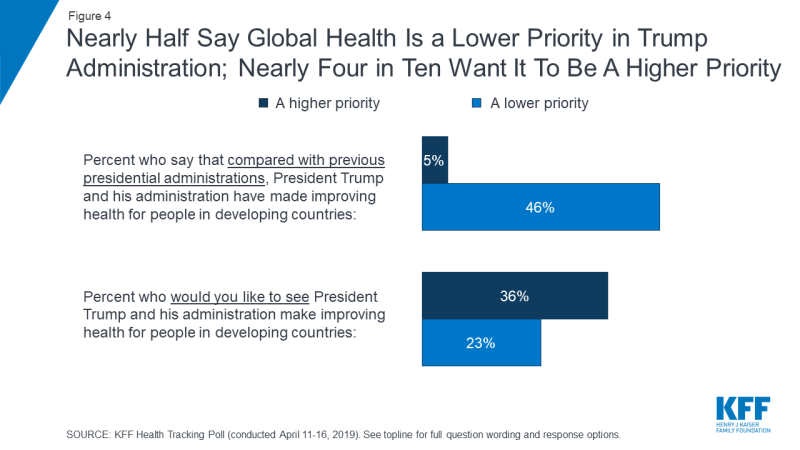
Figure 4: Nearly Half Say Global Health Is a Lower Priority in Trump Administration; Nearly Four in Ten Want It To Be A Higher Priority
Americans’ Views on U.S. Participation in joint efforts in global health
In terms of how the U.S. should invest in global health, more than twice as many Americans believe the U.S. should participate in joint “international efforts” to improve global health (67 percent) than say the U.S. should “operate on its own” (26 percent) (Figure 5). This holds across party, though the divide is larger among Democrats (78 percent v. 17 percent) and independents (70 percent v. 25 percent), compared to Republicans (57 percent v. 36 percent).
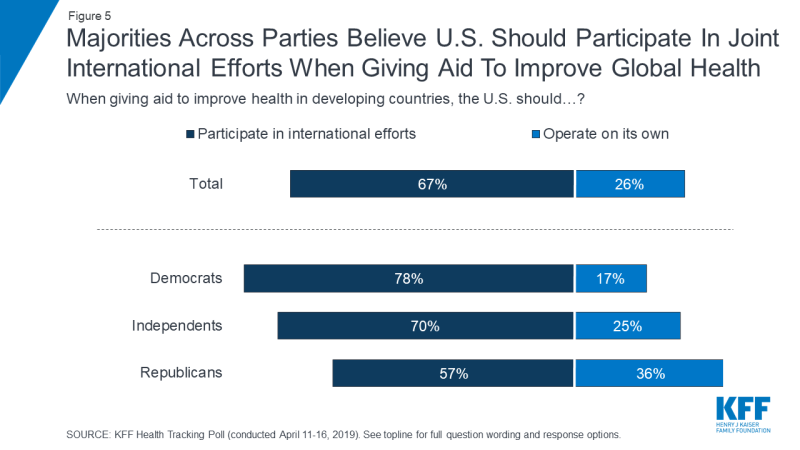
Figure 5: Majorities Across Parties Believe U.S. Should Participate In Joint International Efforts When Giving Aid To Improve Global Health
In fact, over the last ten years, the public has become even more in favor of U.S. participation in joint international efforts (Figure 6). In 2009, 55 percent of Americans expressed that opinion, compared to 67 percent in our most recent KFF Health Tracking Poll. The share saying the U.S. should operate on its own decreased from 39 percent to 26 percent over that same time period. These views are at odds with the current direction of the administration, which has moved to reduce U.S. engagement in joint international efforts and initiatives.
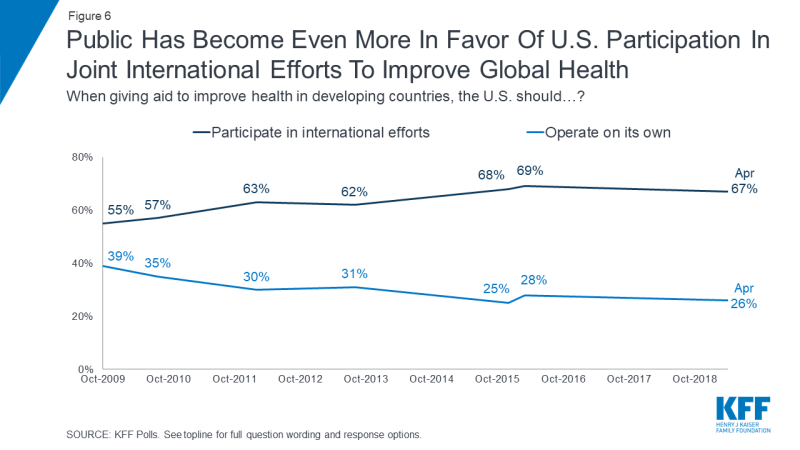
Figure 6: Public Has Become Even More In Favor Of U.S. Participation In Joint International Efforts To Improve Global Health
Evidence of Increased Partisanship regarding Support for U.S. Global Health Spending
At the same time, there has been an increasing partisan divide regarding views of U.S. spending on global health. In 2009, one-fourth (23 percent) of Republicans and one in seven (14 percent) Democrats said they felt the U.S. was spending “too much” on efforts to improve health for people in developing countries. Ten years later, the share of Republicans who express this view grew 17 percentage points (up to 40 percent) while among Democrats, the share is still about one in seven (17 percent) (Figure 7).

